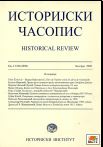Српско-црногорски односи и питање устанка у Турској с посебним освртом на извештаје Николе Јовановића Окана (1860-1866)
Serbo-Montenegrin Relations and the Question of Uprising in Turkey with Special Rerference to Statements of Nikola Jovanovic Okan (1860-1866)
Author(s): Nenad UrićSubject(s): History
Published by: Istorijski institut, Beograd
Keywords: Serbia; Prince Michael; the dynasty Petrovic; the Serbian-Bosnian Committee (1860-61); Nikola Jovanovic Okan; Herzegovinian rebellion; Montenegrin-Turkish War in 1862; the preparation of the uprising (1865)
Summary/Abstract: The work is first part of the paper about Serbian-Montenegrin relations during the preparation of the uprising in the Balkan Christians during the second government of Prince Michael and regency. The paper discusses the relationship between Serbia and Montenegro in the first half of the sixties of the nineteenth century. At the beginning of the reign of Prince Michael the preparation of the uprising was the task of the Serbian- Bosnian Committee (1860-1861), which was established at the end of the government of Prince Miloš. For operations in Bosnia and Herzegovina merchant Nikola Jovanovic Okan was in charge of the committee. He moved from Sarajevo to Belgrade after the suppression of the uprising in Bosnia in 1858. At the end of the 1862 after the defeat of Montenegro in the war with Turkey, he stayed in Cetinje and talked with Prince Nicholas. He subsequently submitted a detailed report to governor Jovan Ristić, which, along with other documents, complets the idea of the contentious issues in relations between Serbia and Montenegro before, during and after the Montenegrin-Turkish War in 1862. In connection with this it is reviewed if the dynasty Petrović in late 50`s and in the first half of the 60`s sought creation of a joint state with Serbia, or only the liberation and expansion of borders of existing state. This raises the question of national feelings of Montenegrins, which will more fully be discussed in the second part. By dissolution of the Serbian-Bosnian Board (May 1861) Prince Michael approached the building of a new strategy of liberation. In the new plan devised by the Prince Mihailo in collaboration with Ilija Garasanin (and ideas presented in Načertanije) the focus was placed on cooperation with the Balkan peoples and states, which like the Principality of Serbia sought total liberation and unification. During the first half of the sixties Turkey seeks to separate Montenegro from Serbia, offering a series of concessions in relation to the peace treaty of September 1862. On the other hand, Turkey is trying to surround Serbia and remove Prince Michael from the throne. Recognizing the difficult economic situation in Montenegro, and great pressure that Turkey exerted on it, Serbia was trying to maintain good relations with Cetinje, giving occasional material assistance.
Journal: Историјски часопис
- Issue Year: 2010
- Issue No: 59
- Page Range: 387-420
- Page Count: 34
- Language: Serbian

